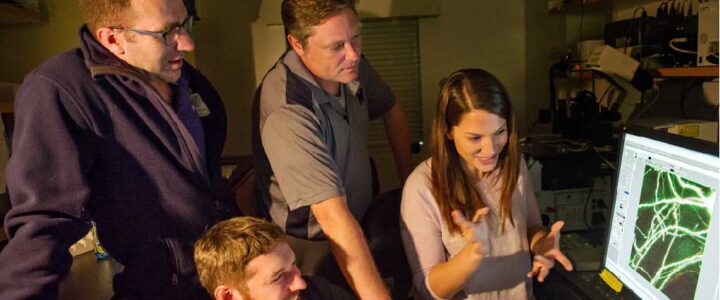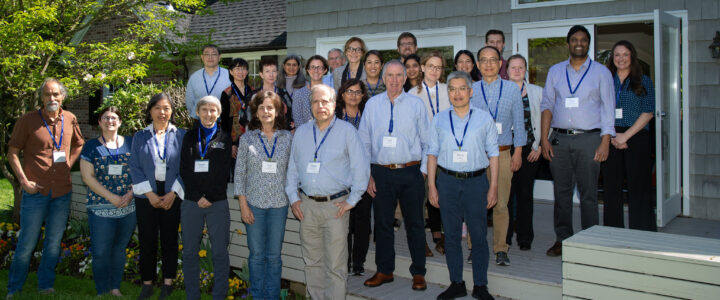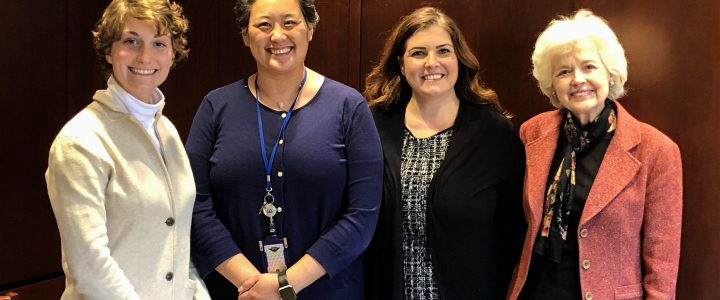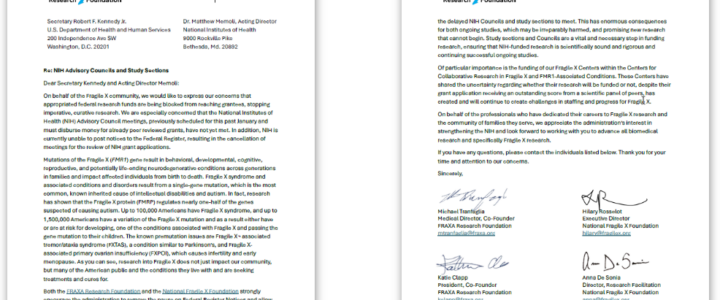NIH funding delays are threatening Fragile X research, putting critical studies and future treatments at risk. FRAXA Research Foundation and NFXF are urging Congress and the NIH to act now. Learn how you can help secure funding for Fragile X research.
Read moreFXTAS
Renewed Hope: Navigating Towards a Cure for Fragile X Syndrome

Discover how Dr. Peter Todd’s latest Fragile X Syndrome research offers hope for advanced treatments and a possible cure, marking a new era in FXS therapy.
Read moreASOs and Fragile X: Addressing the Most Asked Questions

Explore the potential of ASOs in treating Fragile X syndrome & FXTAS. Dive into a comprehensive Q&A addressing key questions and breakthrough findings.
Read moreBreakthrough Discoveries in Fragile X Research: Insights from Special Banbury Meeting on Curative Therapies

Explore the latest breakthroughs in Fragile X research unveiled at the recent Banbury Meeting. Discover novel strategies, from gene therapy to protein replacement, that bring hope for curative therapies.
Read moreTowards Understanding the Role of FMRP in Human Brain Development Using Brain Organoids

Dr. Zhexing Wen and Dr. Peng Jin of the newly funded Fragile X Center of Excellence at Emory University School of Medicine join us in this seminar to present about Understanding the Role of FMRP in Human Brain Development Using Brain Organoids.
Read moreNational Institutes of Health Releases Fragile X Strategic Plan

FRAXA Program Coordinator, Elle Skala, and long time FRAXA supporter and previous Board Member, Mary Beth Busby, traveled to the National Institutes of Health earlier this week. The timing of this meeting was perfect because the National Institutes of Health (NIH) just released their long-anticipated Strategic Plan for Fragile X Syndrome, FXTAS, and FXPOI. It will guide federal Fragile X research funding for at least the next five years and open the door for continued funding of the Fragile X Research Centers of Excellence.
Read moreHow Promising is CRISPR for Fragile X?

Peter Todd, MD, PhD, Assistant Professor in the Department of Neurology in the University of Michigan Medical School, was awarded a FRAXA Research Grant for gene reactivation with the use of CRISPR. In this interview he tells us about CRISPR in Fragile X research, how realistic is it that it could turn the Fragile X gene back on, and if it can really cure Fragile X.
Read moreFragile X Mutant Mouse Models

With $375,000 in grants from the FRAXA Research Foundation since 2009, Dr. David Nelson has developed an impressive array of advanced mouse models of Fragile X, at Baylor College of Medicine. These models are available to investigators worldwide on request. This resource has been essential for a broad, rapid distribution of Fragile X and related gene mouse models and has increased the pace of Fragile X research.
Read moreUniversity of Michigan researcher Peter Todd, MD, PhD, Aims to Selectively Turn the Fragile X Gene Back on in Human Cells

Fish like salmon are born in fresh water streams and rivers. When the time comes for them to breed, they return to the stream of their birth to lay eggs in the same spot where they were born. To accomplish this, they must swim upstream against the current or flow of the stream. Taking a page out of the salmon DNA playbook, University of Michigan scientists Peter Todd, MD, PhD, and postdoctoral fellow Jill Haenfler, Ph.D., are exploring unchartered waters to find a cure for Fragile X Syndrome. The researchers are adapting CRISPR research to reactivate the FMR1 gene, which provides instructions for making a protein called FMRP — needed for normal brain development.
Read moreResearcher David Nelson, PhD, Explores New Cell Strategies for Fragile X Syndrome, FXTAS and FXPOI

It’s rare to find a researcher working on the Big Three — Fragile X Syndrome (FXS), Fragile X-associated Tremor/Ataxia Syndrome (FXTAS) and Fragile X-associated primary ovarian insufficiency (FXPOI). Then again, David Nelson, PhD, is the rare bird. Nelson is a professor of Molecular and Human Genetics, Baylor College of Medicine, and director of Baylor’s Graduate Program in Integrative Molecular and Biomedical Sciences. He has been involved in FXS research since the late 1980s where he helped identify the mutation and the FMR1 gene. These days, researchers in Nelson’s lab at Baylor are studying FXS, FXTAS and FXPOI using mouse models.
Read moreNIH Awards $35 Million to Three Fragile X Research Teams

The National Institutes of Health has just announced new awards of $35 million over five years to support three Centers for Collaborative Research in Fragile X. Investigators at these centers will seek to better understand Fragile X-associated disorders and work toward developing effective treatments. All of these scientists have been funded for years by FRAXA Research Foundation, and now each team will receive over $2 million per year for five years!
Read moreWhat Treatments Work for FXTAS?
Many older family members in the Fragile X community are affected by FXTAS (Fragile X-associated Tremor/Ataxia Syndrome). We all hope that knowing the underlying cause of neurodegenerative symptoms in FXTAS will help in the development of specific treatments over the long term. In the short term, we would also hope that having a specific diagnosis would help us to identify particular available treatments which might be more effective than others.
Read moreSmall Molecules To Target r(CGG) Expansions to Treat Fragile X Syndrome

With a 2-year, $90,000 grant from FRAXA Research Foundation, Dr.’s Matthew Disney and Wang-Yong Yang worked to correct the underlying problem in Fragile X: the silencing of the Fragile X gene (FMR1) and the resulting lack of FMRP (Fragile X Mental Retardation Protein). Their approach was to use novel small molecules to target the abnormal CGG repeats before the FMR1 gene.
Read moreEfficient Screening for Pharmaceutical Amelioration of FXS Behavioral Deficits in Drosophila

With a $112,250 grant from FRAXA Research Foundation over 3 years, Dr. Efthimios Skoulakis and his team from the Institute of Cellular and Developmental Biology conducted the first FRAXA project in Greece, where they developed a speedy new test for learning problems in fruit flies, which allowed them to test a number of drugs that are potential Fragile X treatments.
Read more
